Fiction by: David Michaeli
From Hebrew: Efrat Yaari
At dawn, through the eastern window, the topmost
leaf in the canopy is colored, luminated, begins to glow. The one next to it also
catches fire, and then another. Blind blaze spreads down the night-chilled
foliage, expands, burning the leaves, searching on dark trunk onwards,
downwards. Then – upright, gleaming to the roots – it stands, prepared for the
day ahead, a tree, a sign, a post.
My uncle was 89 years old. A robust looking man
with a pinkish-hued face. He lived on the third floor of an anonymous building
in a suburban town, surrounded by geography books, maps, photographs and studies.
The dark shelves in his library hid in their widening cracks ages of fallen
trees, cut, designed, and lacquered. Now they are splitting, slowly peeling,
revealing a hidden layer, carrying on their backs time that is categorized, edited, selected and crumbling to
atoms of dust and ink. Patterns fragmenting, etchings fading, descending towards the enormous crevices of wounds,
burning between continents of wrinkled pages, sunken at the bottom of an ocean
circling the earth. There they will pass through fire, will be purified, and after thirty thousand
years they will rise up renewed to the metal leaves of future woods. Some of the books, their spine disintegrated,
expose the inner spinelets of the sewn pamphlets. The binding glue became delicacy
to the minute deconstructionists of culture. Albino spiders of closed rooms,
various mites and split tailed silverfish, flat like tiny sand sharks quickly glide on their lashes of legs, dive and rise and
immediately disappear again in a vertical sea of congealed, dusty grey, paper.
Mute for three-years, my uncle spent the days on
a wheelchair staring at the boxed TV screen, flickering with hushed sound. His diaper was changed, twice a day, by a
foreign caretaker from a distant island in the eastern seas. His mind was crumbled, wet, sponge-like,
heavy. His head now sloping, bold. He slowly lifts it, his rigid neck muscles
slanting rightwards toward the clavicle as a thickening gnarl. His eyes look
through me for a while and suddenly abandon me diverting downwards. He
powerfully clings to the hand I hold out to him and does not let go. The back
of his hand is scabbed. His forearm blemished, tightly crossed by wrinkles, dry
freckles, depressions. The extreme Mediterranean sun weathering. This is the
hand that was placed possessively on metal curvatures of vehicles and weapons,
baked for hours on end in the unforgiving radiation and glare. Did he hear me?
Did he recognize me? Where did his systematic, awesome memory vanish to? There
was no way for me to know if something was still hidden within him. Would you
like to be embraced by a young woman? I would joke and then turn solemn. At
times, this question would arise a choking sneer, that faded to a cough and a phlegmy discharge. The caretake would hurry to him with a paper tissue.
In the old etchings, I found Wilson's Arch,
rabid dogs growled in the dumpsters that surrounded the walls, Rachel's tomb,
the dark Kidron valley, the banks of the Arnon river, and the great salt flats.
You are carrying me southwards, I thought. The pages' edges thinly covered with
gold. Lot's wife. Solomo's Pillars.
Ezion-Geber. Fishermen in Ras Burka. Further away, like a transparent cloud lay
the islands of the east. The ancient book led me through the slowly widening
scar of the Great Rift Valley. Bears and lions, horizontal acacias in its
pages.
Another book sketched the indiscernible
impressions left by the Turkish and British armies on the calm dunes of Gaza.
Maps and drawings carried the mass of the canons dragged and sinking, and the
weight of the horses collapsing with their riders amongst the sand flies.
Crumbling grey-turf and sand-colored pamphlets
exposed the Italian Renaissance with olden offset printing; nude Cleopatra,
cruel and sublime on the throne, her fair bosom, dark hair,
golden ornaments, her decisive gaze.
I found the map in his bedroom. A
state-of-the-art, adjustable bed lined with a pressure relieving mattress
covered with a waterproof overlay and a sheet, was positioned
along the southern wall. An old closet against the western wall. Its light lamination partly detached from the wood, curving
upwards into the room, revealing a map of contact adhesive stains. Its drawers
refusing to open. Smell of a closed archive. In the top drawer, documents and
letters packed in ivory-colored praline boxes yellowish with age. In the second
drawer, opened with a loud squeak, a pre-revolution Russian-style wooden box
with rounded waists and corners, covered in amber lacquer, with golden rims. In
it were old certificates, a handful of black and white photographs, medals
hanging on rigid ribbons of fabric and faded lines of color. The winged swastika-adorned
medal of the Luftwaffe Stuka pilot shot down in a lengthy shriek to the sandy
waves of the western desert. Behind the wooden box, the scent of iron. A dark Beretta
pistol. A tin canteen with a cork plug, flat and old, wrapped in khaki wool. A big
rectangular metal box, with sharp corners, murky with age. I pulled it and
opened it with bone-screeching effort. Large
imperial notes of Russian currency, Ottoman, British, Spanish. Copper, bronze and
silver coins. Bullets. A miniature model of a Japanese sword. A map.
I took in with pleasure the scent of the canned
memories, embalmed print and preserved paper. I caressed the delicate worn
texture of the large notes. I held the flat pistol, evaluating its weight. I
drew out the miniature sword from the wooden sheath. Its miniscule shine was as determined as that
of its larger sisters in the armories. I put it all back in place. I took the
map to the other room. The paper was rigid with time, unwillingly unfolding
against the wish of the folds to remain undisturbed with their outlines of dry
sweat. I spread the map carefully so as not to tear it. On it, the shape of the
land was meticulously drawn. Some of lines have faded, some fragmented by the
folds, some steady. The thinnest contours of the roads stretched, crossed,
diagonalized. Tiny comments written in precise, painted Roman letters, next to
them. In the bottom righthand side the word "pinakez" was inscribed in worn ink. Minute ink veins were pumped into the
paper's capillaries, defused to a halo around the letters. The map had seven parallels of latitude, and seven parallels of
longitude. The fourth longitude line and the fourth latitude line crossed at
the naval of a drafted rose held in the open palm of a small feminine figurine
with no eyes nor clothes, surrounded by storm demons. The coordinates were not Mercator's. The south was at the top and the north
below.
My uncle sat by the table. The caretaker patiently
feeding him, humming as he repeatedly drove the spoon from the table to his
slow mouth. I showed the map to him. He looked at it, blank, and then moved his
head away from me downwards. Later when I held my hand out to him, he
forcefully grabbed it and did not let go. His mouth severe and satiated, his
breath heavy and whizzing. After a while I carefully extracted my hand out of
his unanswered, relentless grasp. I pulled my hand, supporting myself with the
other arm, extracting it one millimeter at a time, quickly yanking it in the
last few millimeters until I was free from his grip that kept on holding on to
the void a while longer, and then slowly letting go. The caretaker wiped his
mouth, smiling at him with parental pride and pushed him in the wheelchair back
to his place in front of the lit box. I folded a section of the tablecloth with
its crumbs and cleared a space on the washed-out black varnish of the wood for
the map.
The map depicted names of towns and cities. The
roads were named as well. A river depicted, an angular depiction of a sea, a
lake. There was no topographic representation of the surface shapes. It resembled a diagram or a highly detailed map of an underground train
system combined with an architectural city plan. A living plentitude of notes. The
bloc of symbols rested on the paper to the right, its circumference rounding.
In it a space gaped, marked as a nameless desert extending roots. A line
created a shadow of a beach over the rusting backdrop, an ocean? And the
romantic, hermetic beauty of the olden map makers, were they naïve? The map
seemed suddenly bleary…. Contaminated by contact.
The traces of the explorers of the white lands
send intersecting ripples over the horizon. The magic. We merely touch it and
it turns into memory's gold. Cooling, congealing, pushing the shadows, lighting
them with the nouns: Pool. Tree. Star. Void kissing the black, clear outlines
of a shore to a horrible calm; the line pales, it begins to crumble. A distant
call, a smell of ancient dust and I briefly blink. The lines on the map,
morning mist? My ears ring with a whistle…. …. mystery's veils melt away. The
peak so climatic, no speck of dust. In such a clear-cut world our hands are
emptier than ever, but what can we do? We are but convicts. We are heroes. The
gaze that sees the road is what makes it disappear, accompanied by our gasp for
air. To chase, to achieve, to maintain the….. Oh! I sneezed, my gaze detached,
cut from the map's net with one blow, meeting his motionless, expressionless
eyes.
Somewhat ponderingly I gently folded the map,
frustrated by its obscureness. I placed it in the folio booklet
stained with papery rust of renaissance paintings over the picture of queen
Cleopatra. A few weeks later I visited again. The caretaker happily smiled at
me. My uncle grasped my hand as powerfully as the last time, without letting
go. After a while, I worked to release it as gently as I could. I took the
crumbling painting folder out of the library and opened it carefully on the
table. In it, the map and the paintings darkened like rubies.
I lifted the map's veil and stood before the
naked queen on the throne with her exposed maidens. One of them, a bodyguard,
covered with transparent waves of fabric collected under and above her naval
leaving it bare. A second one, kneeling, alert. The third protecting her queen.
All evident at the left side of the picture aligned with their ferocious
queen's gaze. A snake bangle of red gold encircles her beehive of black hair,
prominently erect over her forehead. Another thin snake of gold slithers, head
up, along her left arm. Her neck is carried on the shaded clavicles' cloud, a palm-leaf
shaped chain of beaten gold and turquoise mounts to her breasts. A wide
bangle engulfs her right wrist, two thin rings on her right pointing finger,
another on her left middle finger and yet another, wide one, on the ring
finger. Her body lights the entire picture, exposed in cool authority. Sitting
down, her left ankle cocked' lifted. Her face tilted leftwards towards
an unknown outside the frame that I can only conjecture. A white marble throne, golden. A canopy. An
imperial purple carpet. Blushing nipples dimming over the white of her bosom.
Up close I saw the painter assembled the stain from a galaxy of slander lines
running through the whitening surrounding sphere. Her blushing cheeks were
formed the same way. The curve of the upper lip, the blue of her black hair. Streaks
upon streaks, meticulous brush strokes, created shadowy whispers near the hairs
governing the lands of her stomach and thighs, drawn upwards darkening an
obtuse curvature over her body's main axis creating a living darkness. Her
naval, the mounting side of her rib. I looked away and then back. Her affluent
brows, looking into her eyes, foggy, teeming with lines leading to an empty
note-less place gleaming in a dark, foreboding chill. I looked away.
I took the map and opened it with prudence,
covering the queen. The sketches seemed frailer than I remembered. I got up and
turned on the lamp hanging over the desk.
As night falls, upright, the trunk extinguished.
A shadow slowly sprouting from the root, so fast, picking one leaf after
another, one branch after the next. The foliage's light fades away, pushed
aside, residing in the leaves other side. Still brilliant with the wind, a
passing shiver stops, it rises from underneath them covering their faces
without stop. The shadows keep flowing from underneath turning off two, three
others and the last one is shutting down.
The map faded in my hands. Only one note
remained. I lifted my gaze. He watched me motionless. Did I mean anything in
his empty gaze or was I a mere shape? His mouth opened, darkened, thin. After a
great effort he uttered a single word out of the bubbling breath well, quickly
cracking lengthwise: "pinakez," he said. I hastened to search for the
written word when the caretaker tapped my shoulder. I turned. He pointed at the
old man. The head tilted ahead, the palms of the hands open. His shadow with
the wheelchair stretched in the bright dust of the disappearing western sunray
touching the wall like a distant note. I let go of the blank paper, I leaned
towards him in the shade and held his cold hands.
Pinakez is the ancient Greek word for map, and stone
tablets. The German-Flemish
cartographer, geographer and cosmographer, Gerardus Mercator, drew in the
16th-century the first modern maps based on a new projection which represented
sailing courses of constant bearing as straight lines—an innovation that is
still employed in nautical charts.






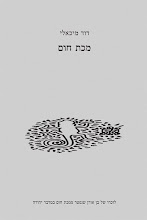
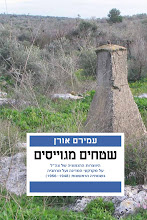
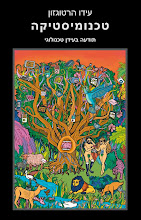
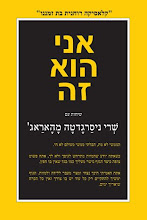
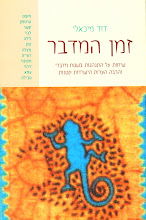
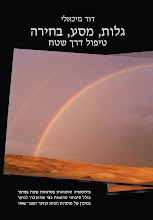
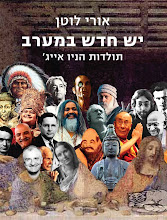

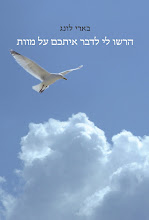


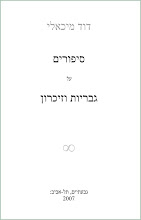
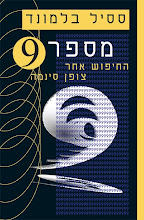
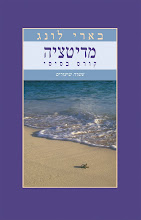
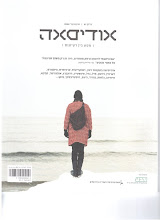

אין תגובות:
הוסף רשומת תגובה